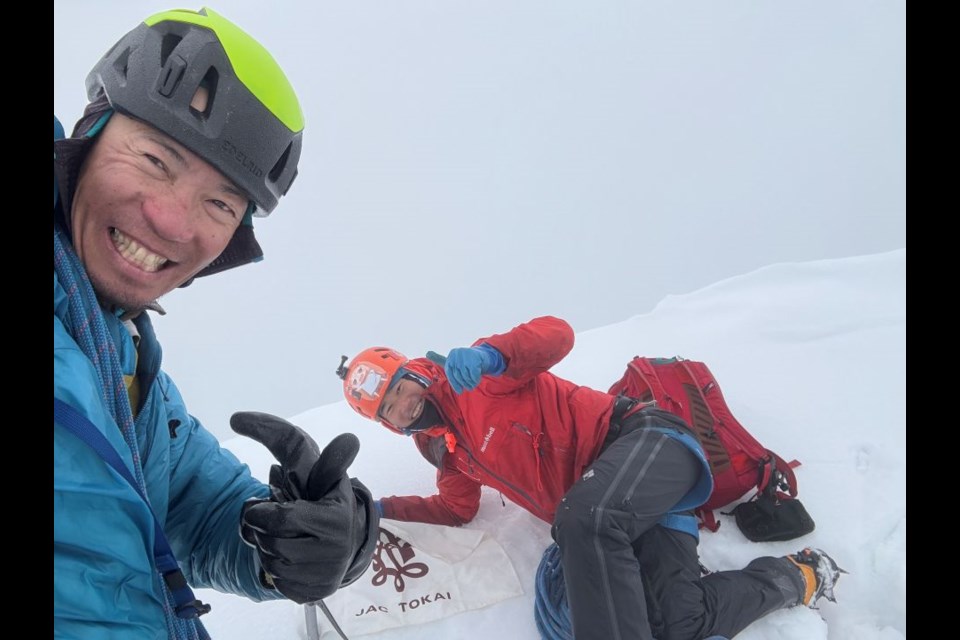JASPER – A group of young Japanese alpinists recently recreated the first iconic climb up Mount Alberta in honour of its centennial.
Located immediately north of the Columbia Icefields in Jasper National Park, Mount Alberta was first summited by Yuko Maki and his team of Japanese climbers on July 21, 1925, at 7:35 p.m. The peak is 3,619 metres above sea level.
“It’s one of the most iconic climbs in Japanese alpine history, and we wanted to honour that legacy,” said Takeshi Tani, a Canmore-based alpinist and member of the Japanese Alpine Club who led the climb.
The expedition was organized by the Japanese Alpine Club and included a mix of experienced and Japanese climbers in their 20s and 30s, with the goal of passing the torch of alpinism to the next generation. Tani escorted 10 climbers to the hut, but only four other climbers—two teams—attempted Mount Alberta with him.
“Everyone brought strong motivation and a great spirit to the mountain,” Tani said.
The team climbed the Japanese route up Mount Alberta, with Tani and Toshiki Kusano summiting at 4:20 p.m. on July 24. Due to challenging weather and route conditions, the descent was long and demanding.
Tani had climbed this route a decade ago to honour the 90th anniversary of the first ascent. Even though it was dry conditions then and was graded at only 5.6, he noted the climb still felt serious.
“This time, it was much more difficult—the entire route felt like the crux,” he said. “It started snowing around 4 a.m., and we kept our crampons on the entire way, which made progress slower and more technical. Managing two rope teams to avoid rockfall added to the mental strain.”
Because Mount Alberta is a large, remote mountain with its own weather system, it requires full commitment and a readiness for anything.
“While the summit ridge was in better shape than the face, descending in bad weather with frozen ropes was extremely tough,” Tani said. “We ended up bivying overnight and continued our descent the next morning.”
During the descent, on nearly flat terrain just above the bivy site, one of the climbers was pulling a frozen rope on the second-to-last rappel when he slipped and fell a few metres.
Although his safety tether caught him, he twisted his ankle badly. Tani said they did not know at the time if it was fractured, since the climber was only able to walk very slowly. To avoid the risk of further injury, they called Parks Canada to evacuate him.
“They responded within a few hours and handled everything with incredible professionalism,” Tani said. “We’re deeply grateful for their help in such difficult, high-mountain conditions.”
The rest of the team hiked to the trailhead. From camp to camp, the entire climb took about 32 hours.
“After experiencing the route in wet, snowy, and cold conditions, I have even more admiration for what Maki and his team accomplished in 1925—with far more limited equipment and knowledge,” Tani said. “Their achievement was not only historic but incredibly bold.”
The alpinists also joined the Mount Alberta Centennial Ceremony held in Jasper on July 21. Tani described it as a moving experience and thanked the Alpine Club of Canada and everyone else who helped organized the event.
To honour the centennial, artists Hiroyasu Tsuri and Tyler Toews collaborated to paint a mural on the north side of the Jasper-Yellowhead Museum. This was organized by the UpLift! Jasper Mural Festival.
Tani thanked the community of Jasper for welcoming them with open arms despite still recovering from last year’s wildfire and emphasized how honoured he felt to be part of the centennial event.
“The connection between Canadian and Japanese mountaineering history is deep and meaningful,” he said. “This climb felt like a bridge between past and future, and I’m especially happy that the young Japanese climbers are now part of Mount Alberta’s story.”




